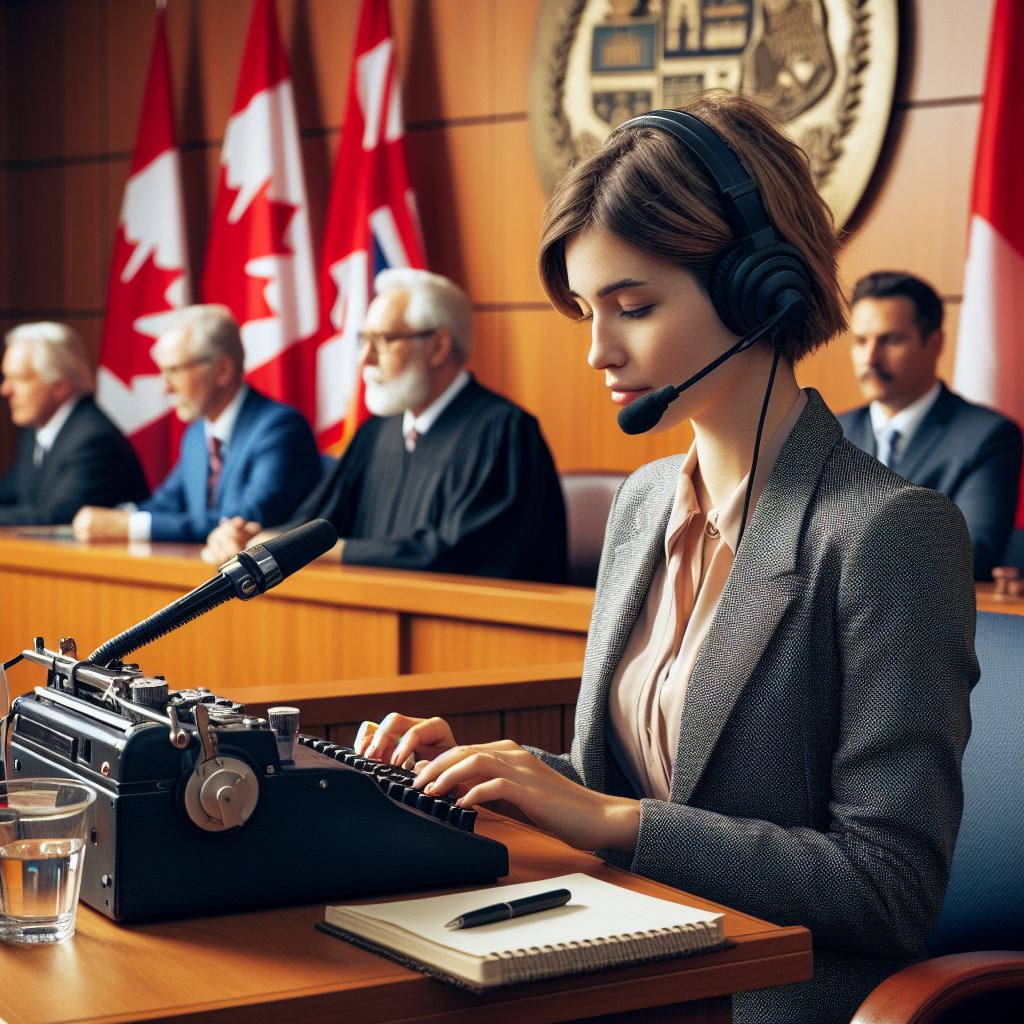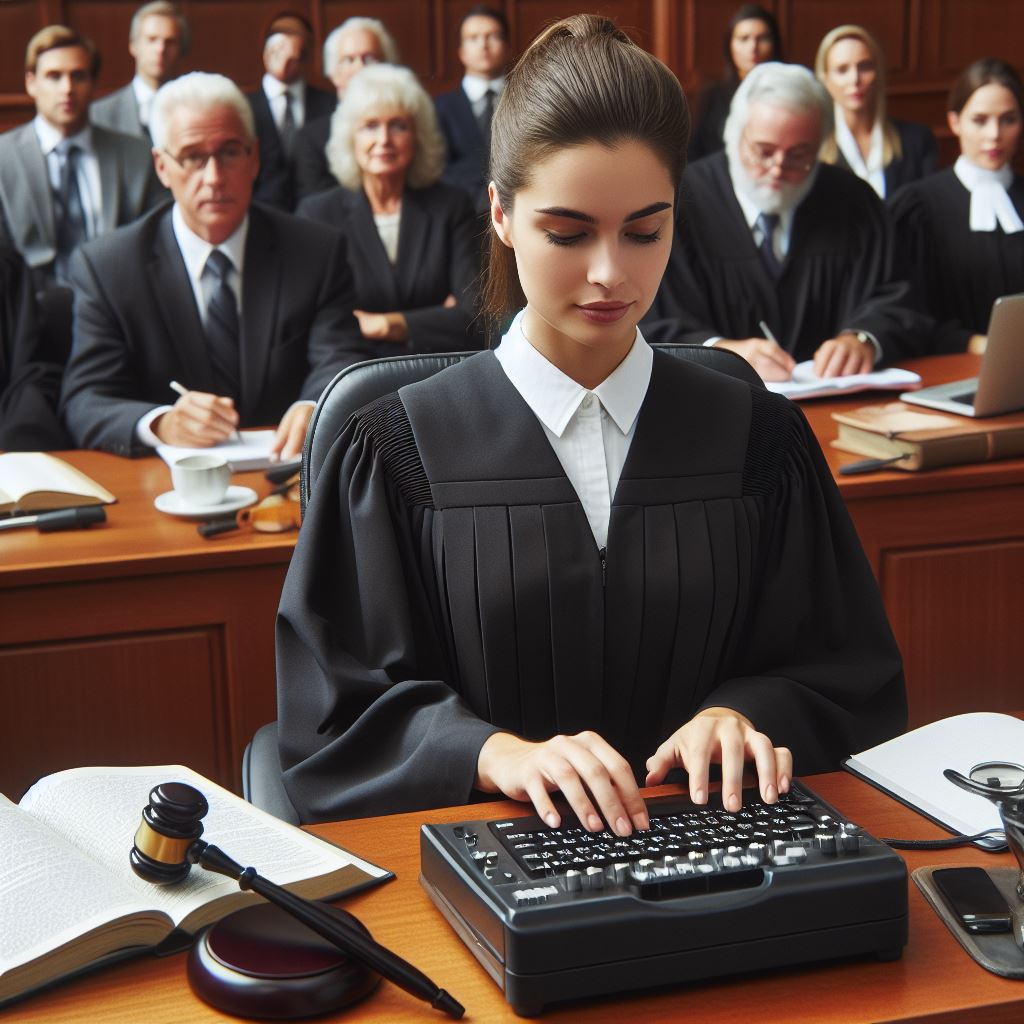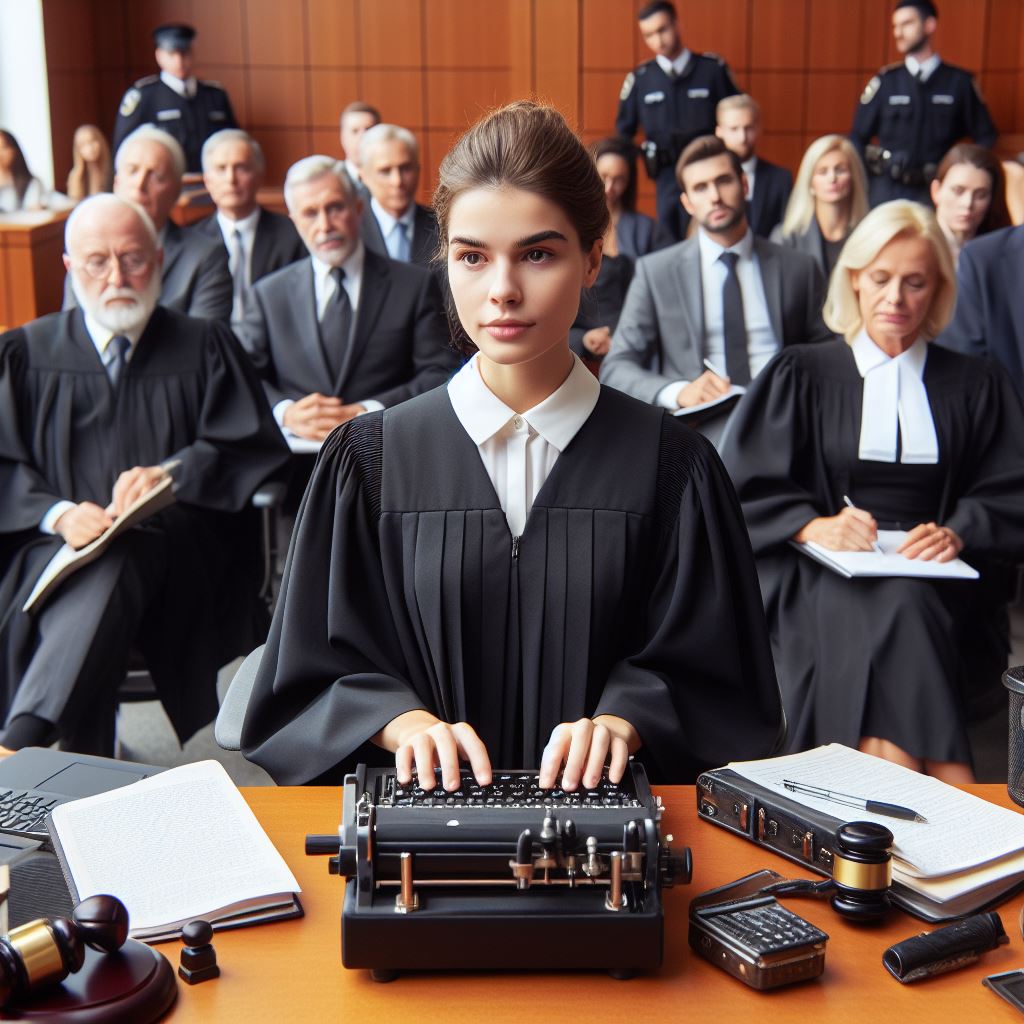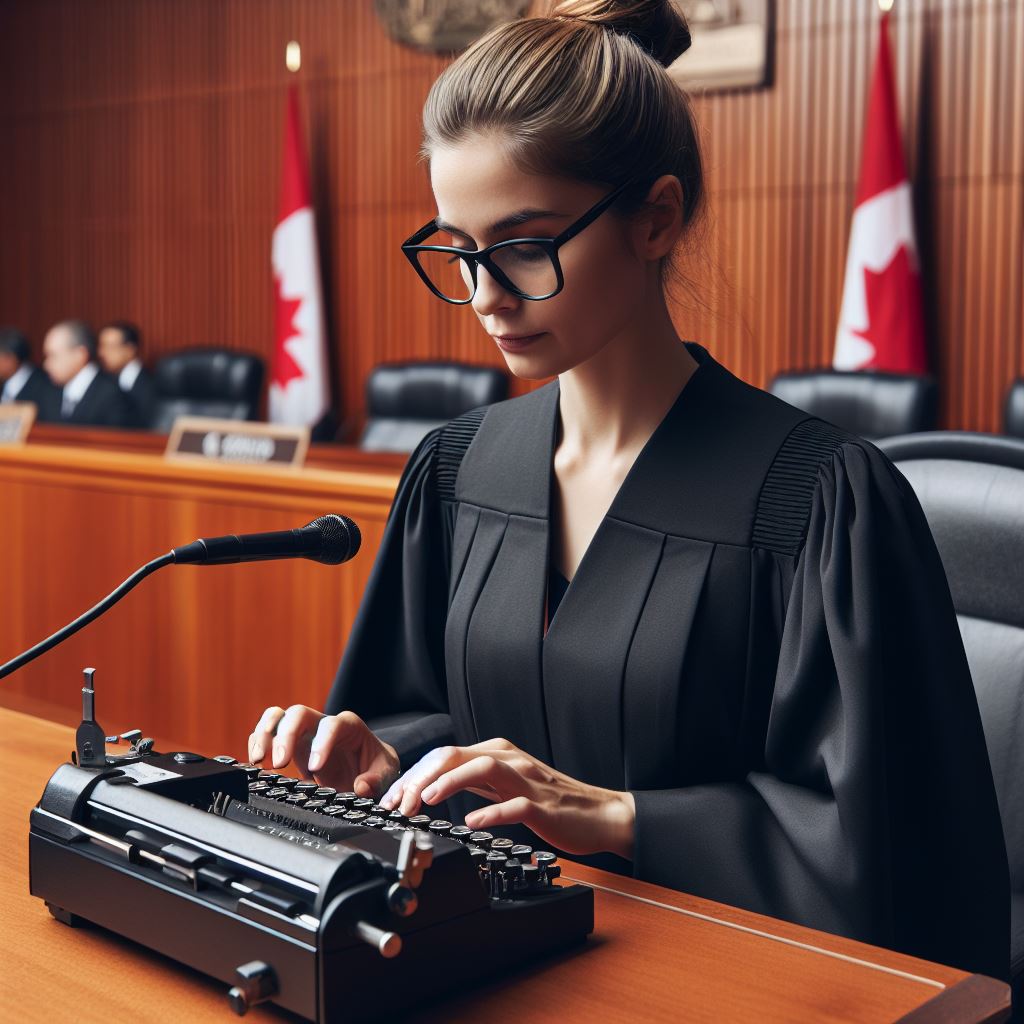Introduction
In the bustling world of courtrooms, John’s nimble fingers dance across the stenotype machine, capturing every spoken word.
His journey began two decades ago, fueled by a passion for precision and a commitment to justice.
With unwavering focus, he transforms spoken testimony into a symphony of words on paper.
In the courtroom’s crucible, John thrives, navigating the complexities of legal discourse with finesse.
He shares anecdotes of tense trials, where his keystrokes echo the heartbeat of justice.
Through technological advancements, he’s witnessed the evolution of his craft, embracing digital tools without compromising accuracy.
Beyond the transcripts, John’s keen perception unveils nuances that evade casual observers.
His dedication to the truth is etched in every transcript, a testament to the indispensable role of a veteran court reporter in the pursuit of justice.
Early career and training
The interviewee’s motivation to become a court reporter
- Passion for the legal field ignited the interviewee’s desire to become a court reporter.
- Fascination with the courtroom drama and a craving for accuracy inspired the interviewee.
- The interviewee’s strong determination to contribute to the administration of justice fueled their motivation.
- The prospect of working in a dynamic field that combines law, technology, and language captivated the interviewee.
- The interviewee’s desire to play a crucial role in preserving the legal record drove their motivation to become a court reporter.
The educational requirements and training process for court reporters
- The interviewee embarked on the path of becoming a court reporter by acquiring a high school diploma.
- Pursuing specialized education in court reporting from an accredited institution became a priority for the interviewee.
- The interviewee explained the importance of obtaining a degree or certification in court reporting from recognized programs.
- Training in stenography, captioning, transcription, and legal terminology formed a significant part of the interviewee’s education.
- The interviewee highlighted the need for continuous education and staying updated with technological advancements in the field.
Challenges or memorable experiences during the interviewee’s early career
- The interviewee recounted the initial challenge of attaining speed and accuracy in transcribing court proceedings.
- Handling complex legal terminology and jargon tested the interviewee’s perseverance and dedication.
- The interviewee shared a memorable experience of reporting an intense trial where high stakes were involved.
- Adapting to different courtrooms and judges’ styles posed a constant challenge during the interviewee’s early career.
- The interviewee faced the pressure of meeting strict deadlines while ensuring accurate and comprehensive transcripts.
In the early stages of their career, the court reporter’s passion for the legal field fueled their journey.
Motivated by a fascination with courtroom drama, they craved accuracy and were drawn to the dynamic nature of the field.
Educational pursuits followed, with a focus on specialized court reporting programs.
The interviewee stressed the importance of recognized certifications, providing essential skills in stenography, transcription, and legal terminology. Continuous learning remained a priority due to the field’s reliance on technology.
Challenges emerged, testing their resolve. Achieving speed and accuracy in transcribing court proceedings required diligent work.
The complexity of legal jargon further pushed their perseverance. Memorable experiences, such as high-stakes trials and adapting to various courtrooms, marked their early career.
In general, the court reporter’s journey involves passion, specialized education, and overcoming challenges.
Their determination in mastering legal intricacies and adapting to diverse settings laid a solid foundation for a successful career in court reporting.
Courtroom experiences
The interviewee’s experience in various court settings
- The veteran court reporter has extensive experience working in a wide range of court settings.
- From bustling city courts to small-town proceedings, the interviewee has seen it all.
- They have adapted to different court atmospheres and maintained professionalism throughout.
- Working in various court settings has given the interviewee a well-rounded perspective.
- They have witnessed the intricacies and nuances of the legal system in action.
The different types of cases the interviewee has covered
- The interviewee has covered a diverse range of cases throughout their career.
- From high-profile criminal trials to civil disputes, they have reported on it all.
- They have transcribed hearings related to family law, personal injury, and corporate litigation.
- No matter the case type, the interviewee approaches each assignment with attentiveness and impartiality.
- They have developed a deep understanding of the legal terminology associated with different types of cases.
Interesting or challenging moments the interviewee has encountered during trials
- The court reporter has faced numerous interesting and challenging moments during trials.
- One memorable incident involved a heated exchange between opposing attorneys.
- The interviewee had to diligently record every word while the tension in the courtroom escalated.
- Another notable experience was transcribing the emotional testimony of a crime victim.
- The interviewee had to remain composed while capturing the intensity of the victim’s account.
These challenging moments have shaped the interviewee’s ability to maintain composure under pressure.
They have also honed their listening skills and the ability to quickly capture accurate information.
Through it all, the interviewee recognizes the importance of their role as a court reporter.
They understand that their work contributes to the integrity and fairness of the justice system.
Overall, the interviewee’s courtroom experiences have provided them with invaluable insights.
They have witnessed the legal process firsthand, gaining a deep appreciation for its complexities.
Their dedication and expertise as a court reporter continue to make a significant impact.
As the interviewee reflects on their career, it is evident that their courtroom experiences have shaped them both professionally and personally.
Read: How to Become a Court Reporter in Canada
Unlock Your Career Potential
Visualize a clear path to success with our tailored Career Consulting service. Personalized insights in just 1-3 days.
Get StartedTechnological advancements and their impact
Influence of technology on the court reporting profession
Court reporting, once a manually-intensive task, has been greatly influenced by technological advancements.
New technologies have led to the development of computer-aided transcription (CAT) software and stenographic machines.
These advancements have increased the efficiency and accuracy of court reporting, enabling faster transcription and real-time reporting.
Modern court reporters now use stenotype machines that have replaced traditional shorthand and typewriters.
CAT software allows court reporters to create an immediate and verbatim transcript, making their job easier.
Video conferencing and remote deposition technologies have also revolutionized the court reporting profession.
Remote depositions have eliminated the need for court reporters to be physically present, saving time and money.
Overall, technology has significantly improved the speed, accuracy, and convenience of court reporting.
Changes witnessed by the interviewee throughout their career
Throughout their career, the interviewee has witnessed numerous changes brought about by technological advancements.
They recall the transition from manual typewriters to computer-based transcription software, which revolutionized the profession.
The interviewee mentions the introduction of digital recording equipment, which enabled more accurate transcription.
They remember how video conferencing technology replaced in-person depositions, making their work more flexible.
Moreover, the interviewee highlights the shift from traditional shorthand to stenotype machines, speeding up the reporting process.
These changes have not only improved efficiency but also transformed the court reporting profession as a whole.
Interviewee’s adaptation to new reporting techniques and equipment
As technology advanced, the interviewee had to adapt to new reporting techniques and equipment throughout their career.
They attended training sessions and workshops to learn how to use CAT software effectively.
The interviewee embraced stenotype machines and underwent extensive training to become proficient in operating them.
They continuously updated their skills to stay current with the latest advancements in court reporting technology.
Adapting to remote deposition technologies was initially a challenge, but the interviewee quickly adapted and embraced the convenience it offered.
They appreciate how technology has made their job less physically demanding and more efficient.
The interviewee acknowledges that embracing technology has been crucial for their continued success in the court reporting profession.
In short, technology has had a profound impact on the court reporting profession.
Advancements in software, equipment, and remote technologies have increased efficiency, accuracy, and convenience.
Court reporters have had to adapt and acquire new skills to keep up with these changes.
Embracing technology has transformed court reporting, making it an essential part of the modern legal system.
Read: A Day in the Life of a Canadian Court Reporter

Skills and Qualities Required
- Listening skills: A court reporter must have exceptional listening skills to capture accurate and complete transcripts.
- Typing speed: Fast and accurate typing skills are essential to keep up with court proceedings.
- Grammar and punctuation: Excellent knowledge of grammar and punctuation ensures the quality and accuracy of the transcripts.
- Attention to detail: Court reporters must be detail-oriented to capture every word, gesture, and emotion accurately.
- Concentration: They need to stay focused during lengthy and complex legal proceedings.
- Time management: Court reporters must be able to manage their time effectively and meet strict deadlines.
- Stress management: The ability to remain calm under pressure is crucial in high-stress court environments.
- Technology proficiency: Familiarity with stenotype machines, real-time closed captioning software, and transcription software is necessary.
- Professionalism: Court reporters should maintain a professional demeanor and adhere to ethical standards.
Importance of Accuracy and Attention to Detail
During the interview, the veteran court reporter highlighted the vital role of accuracy and attention to detail in their profession.
They emphasized that even a small mistake in the transcript can have significant consequences, potentially altering the outcome of a case.
The court reporter shared an instance where a single incorrect word misinterpreted the defendant’s statement, leading to a misleading portrayal in the court record.
Such inaccuracies can undermine the fairness and integrity of the legal system.
Furthermore, the interviewee explained that attention to detail extends beyond capturing spoken words.
Nonverbal cues, pauses, and even the tone of voice provide crucial context to the proceedings, which court reporters must accurately reflect in their transcripts.
Advice for Aspiring Court Reporters
For aspiring court reporters, the interviewee offered valuable advice based on their extensive experience:
- Invest in education and training: Formal education and specialized training programs equip aspiring court reporters with the necessary skills and knowledge.
- Practice regularly: Continuous practice improves typing speed, accuracy, and the ability to capture spoken words more efficiently.
- Attend court proceedings: Observing real court proceedings helps aspiring court reporters understand the dynamics and challenges they will face.
- Build a professional network: Connecting with experienced court reporters allows aspiring professionals to learn from their expertise and gain valuable insights.
- Stay updated with technology: Embracing technological advancements in the field is crucial for maintaining efficiency and accuracy.
- Develop strong work ethics: Court reporters should exhibit professionalism, reliability, and confidentiality in their work.
- Stay adaptable: Flexibility is essential to adapt to different courtroom settings, speech patterns, and legal terminologies.
- Seek mentorship: Finding a mentor who can provide guidance and support throughout the journey can be immensely helpful.
In essence, the skills required to be a successful court reporter include excellent listening, typing, and grammar skills, attention to detail, concentration, time management, stress management, technological proficiency, and professionalism.
Accuracy and attention to detail are paramount, as they ensure the integrity of the legal proceedings.
Aspiring court reporters should focus on education, practice, observation, network building, and staying updated with technology while nurturing strong work ethics and seeking mentorship.
Read: Crafting the Perfect Legal Assistant Resume
Work-life balance and personal growth
In this section, we will delve into the interviewee’s thoughts on maintaining a healthy work-life balance, discuss any professional development opportunities they have pursued, and explore their perspective on personal growth and the evolution of their career.
Maintaining a Healthy Work-Life Balance
When asked about work-life balance, the veteran court reporter acknowledged the challenges it presents. They emphasized the importance of setting boundaries and prioritizing self-care.
The interviewee shared their belief that maintaining a healthy work-life balance not only ensures their own well-being but also enhances the quality of their work.
They allocate specific time for family, friends, and hobbies outside of work.
By proactively managing their schedule and committing to activities outside of work, the interviewee believes they are better able to avoid burnout and maintain a sense of fulfillment.
Professional Development Opportunities Pursued
In terms of professional development, the interviewee highlighted their proactive approach to continuously enhancing their skills and staying up-to-date with industry advancements.
They have attended numerous conferences, workshops, and training programs focused on improving their court reporting techniques, understanding new technologies, and staying abreast of relevant legal procedures.
The interviewee also emphasized the importance of networking within the court reporting community. They actively engage with fellow professionals to exchange knowledge, seek advice, and foster mutually beneficial relationships.
Perspective on Personal Growth and Career Evolution
The interviewee expressed their belief that personal growth should be an ongoing pursuit throughout their career. They perceive every experience as an opportunity for learning and development.
They explained that the court reporting profession has evolved significantly since they first started.
Technological advancements have led to changes in the way court reporters collect and transcribe information.
The interviewee embraces these changes, recognizing the need to adapt to new tools and methodologies.
They actively seek opportunities to expand their skill set and embrace emerging technologies to remain relevant in their field.
Furthermore, the interviewee highlighted the importance of embracing change and looking for ways to contribute to their profession.
They have joined professional organizations and actively participate in discussions and initiatives aimed at advancing the court reporting profession.
According to the interviewee, personal growth goes hand in hand with career growth.
They view each as a continuous process, where one’s professional development and personal goals align to create a fulfilling and successful career.
In fact, the interviewee provided valuable insights into maintaining work-life balance, pursuing professional development opportunities, and embracing personal growth throughout their career as a court reporter.
Their perspectives serve as a source of inspiration for aspiring court reporters and professionals in any field seeking to achieve a fulfilling work-life balance while continuously evolving in their careers.
Read: Continuing Education for Legal Assistants
Closing remarks
In our enlightening interview, the veteran court reporter unveiled the intricate and fulfilling aspects of their profession.
Skillful precision defines each keystroke during the fast-paced courtroom drama.
The seasoned expert illuminated the meticulous process of transcribing spoken words into a written record.
Navigating through legal jargon and rapid-fire dialogues demands unwavering concentration and quick reflexes.
The court reporter’s dedication to accuracy shapes the foundation of judicial proceedings. We extend heartfelt thanks for the veteran’s openness in sharing their wealth of knowledge.
Their experiences serve as a testament to the vital role court reporters play in upholding justice.
Let’s acknowledge and honor these unsung heroes behind the scenes of the legal stage.
Gratitude fills our hearts for this eye-opening glimpse into the world of a veteran court reporter.




